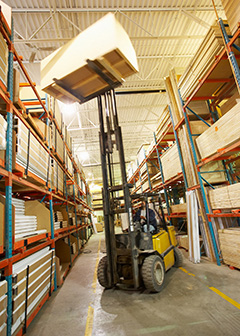Material Moving Machine Operator
Material Moving Machine Operator
Does this career fit your work personality?
Begin The Career Assessment Test- Best Fitting Careers
- Work Personality Strengths
- Work Style Preferences
- and more
Job Outlook
Overall employment of material moving machine operators is projected to grow 4 percent from 2022 to 2032, about as fast as the average for all occupations.
About 88,900 openings for material moving machine operators are projected each year, on average, over the decade. Many of those openings are expected to result from the need to replace workers who transfer to different occupations or exit the labor force, such as to retire.
What Material Moving Machine Operators Do
Material moving machine operators use equipment to transport objects. For example, some operators move goods around factories and storage areas or onto container ships. Others move construction materials around building sites.
Duties
Material moving machine operators typically do the following:
- Set up and inspect material moving equipment
- Control equipment with levers, wheels, or foot pedals
- Move material according to a plan or schedule
- Signal and direct workers to load and unload materials
- Keep a record of the material they move and where they move it to
- Make minor repairs to their equipment
In warehouses and factories, most material moving machine operators use forklifts and conveyor belts. Wireless sensors and tags keep track of merchandise, allowing operators to locate it faster. Some operators also check goods for damage. These operators usually work closely with hand laborers and material movers.
In construction, material moving machine operators transport objects around building sites. Some work on a building site for the entire length of the construction project. For example, certain material moving machine operators help to construct highrise buildings by transporting materials to workers who are far above ground level. (For information about workers who operate heavy machinery for building, road, and other construction sites, see the profile on construction equipment operators.)
All material moving machine operators are responsible for safely controlling their equipment or vehicle.
The following are examples of types of material moving machine operators:
Conveyor operators and tenders control conveyor systems that move materials on an automatic belt. They monitor sensors to regulate the speed with which the system’s conveyor belt moves. They move materials to and from places such as storage areas, vehicles, and building sites. Operators also may check the shipping order and determine the route that materials take along a conveyor.
Crane and tower operators use cable and tower equipment to lift and move materials, machinery, or other heavy objects. From a control station, operators extend and retract horizontal booms, rotate the superstructure, and lower and raise hooks attached to cables at the end of their crane or tower. Operators usually are guided by workers on the ground who use hand signals or transmit voice signals through a radio. Crane and tower operators usually work at construction sites or major ports, where they load and unload cargo. Operators also may work in iron and steel mills.
Dredge operators excavate waterways. They operate equipment on the water to remove sand, gravel, or rock from harbors or lakes. Removing these materials helps to prevent erosion and to maintain navigable waterways, allowing larger ships to use ports. Dredging also is used to help restore wetlands and maintain beaches.
Hoist and winch operators, also called derrick operators, control the movement of platforms, cables, and cages that transport workers or materials in industrial operations, such as constructing a highrise building. Operators regulate the speed of the equipment on the based on the needs of the workers.
Industrial truck and tractor operators drive trucks and tractors that move materials around storage yards, warehouses, or other worksites. These trucks, often called forklifts, have a lifting mechanism and forks, which make them useful for moving heavy and large objects. Some industrial truck and tractor operators drive tractors that pull trailers loaded with material around factories or storage areas.

Work Environment

Material moving machine operators held about 879,500 jobs in 2022. Employment in the detailed occupations that make up material moving machine operators was distributed as follows:
| Industrial truck and tractor operators | 796,600 |
| Crane and tower operators | 48,400 |
| Conveyor operators and tenders | 30,600 |
| Hoist and winch operators | 2,800 |
| Dredge operators | 1,000 |
The largest employers of material moving machine operators were as follows:
| Warehousing and storage | 37% |
| Wholesale trade | 10 |
| Temporary help services | 8 |
| Food manufacturing | 5 |
| Construction | 3 |
Material moving machine operators work indoors and outdoors in a variety of industries.
Injuries and Illnesses
Hoist and winch operators have one of the highest rates of injuries and illnesses of all occupations.
Many workers wear personal protective equipment—including gloves, hardhats, and harnesses—to guard against injury.
Work Schedules
Most material moving machine operators work full time, and some work more than 40 hours per week. Because materials are shipped around the clock, some work overnight shifts.
Getting Started
How to Become a Material Moving Machine Operator

Education and training requirements vary by occupation. Crane operators typically have several years of experience in a related occupation.
Education
Although no formal educational credential is typically required, companies may prefer to hire material moving machine operators who have a high school diploma. For crane and tower operators and dredge operators, a high school diploma or equivalent is typically required.
Training
Material moving machine operators typically are trained on the job in less than a month, but the amount of time spent in training varies with the type of machine. Some machines, such as cranes and towers, are complex and may require several months of training. Others, such as industrial trucks and forklifts, may take only a few days to learn how to operate. New workers usually are trained by an experienced employee.
During their training, material moving machine operators learn safety rules, many of which are standardized through the Occupational Safety & Health Administration (OSHA). Employers must certify that each operator has received the proper training. Operators who work with hazardous materials receive additional training.
The International Union of Operating Engineers offers training programs for heavy-equipment operators, such as crane operators.
Licenses, Certifications, and Registrations
Some states and cities require crane operators to be licensed. Operators typically must complete a skills test in which they show that they can control a crane. They also must pass a written exam that tests their knowledge of safety rules and procedures. Check with your state or city licensing agency for specific requirements.
Employers may require or prefer that workers become certified. For example, the National Commission for the Certification of Crane Operators (NCCCO) offers several certifications for crane operators and related workers.
Work Experience in a Related Occupation
Crane and tower operators typically have several years of experience working as construction equipment operators, hoist and winch operators, or riggers and signalers.
Contacts for More Information
For more information about careers as a material moving machine operator, visit
International Union of Operating Engineers (IUOE)
National Commission for the Certification of Crane Operators (NCCCO)
Similar Occupations
This table shows a list of occupations with job duties that are similar to those of material moving machine operators.
| Occupation | Job Duties | Entry-Level Education | Median Annual Pay, May 2022 | |
|---|---|---|---|---|

|
Construction Equipment Operators |
Construction equipment operators drive, maneuver, or control the heavy machinery used to construct roads, buildings, and other structures. |
High school diploma or equivalent | $51,050 |

|
Delivery Truck Drivers and Driver/Sales Workers |
Delivery truck drivers and driver/sales workers pick up, transport, and drop off packages and small shipments within a local region or urban area. |
High school diploma or equivalent | $38,220 |

|
Hand Laborers and Material Movers |
Hand laborers and material movers manually move freight, stock, or other materials. |
See How to Become One | $34,960 |

|
Heavy and Tractor-trailer Truck Drivers |
Heavy and tractor-trailer truck drivers transport goods from one location to another. |
Postsecondary nondegree award | $49,920 |

|
Railroad Workers |
Railroad workers ensure that passenger and freight trains operate safely. They may drive trains, coordinate the activities of the trains, or control signals and switches in the rail yard. |
High school diploma or equivalent | $68,960 |

|
Water Transportation Workers |
Water transportation workers operate and maintain vessels that take cargo and people over water. |
See How to Become One | $66,100 |
